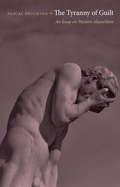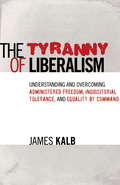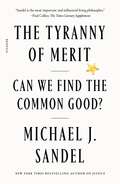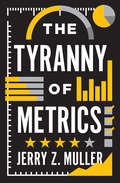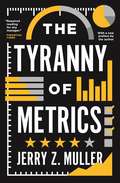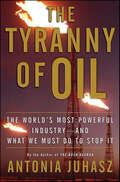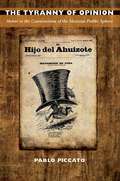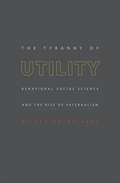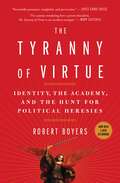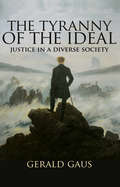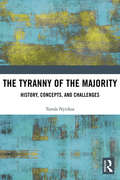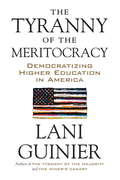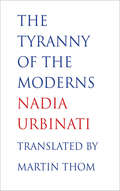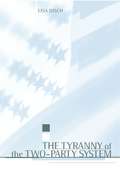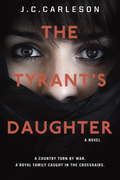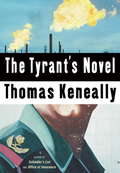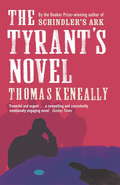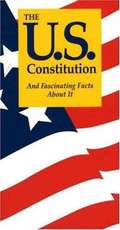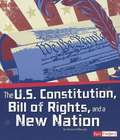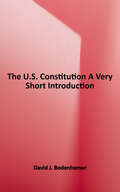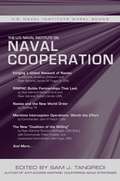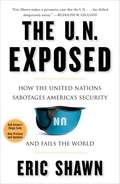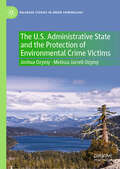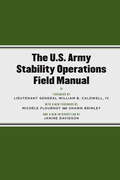- Table View
- List View
The Tyranny of Guilt: An Essay on Western Masochism
by Pascal BrucknerWhy the West must overcome its guilty conscience to foster a better global futureFascism, communism, genocide, slavery, racism, imperialism—the West has no shortage of reasons for guilt. And, indeed, since the Holocaust and the end of World War II, Europeans in particular have been consumed by remorse. But Pascal Bruckner argues that guilt has now gone too far. It has become a pathology, and even an obstacle to fighting today's atrocities. Bruckner, one of France's leading writers and public intellectuals, argues that obsessive guilt has obscured important realities. The West has no monopoly on evil, and has destroyed monsters as well as created them—leading in the abolition of slavery, renouncing colonialism, building peaceful and prosperous communities, and establishing rules and institutions that are models for the world. The West should be proud—and ready to defend itself and its values. In this, Europeans should learn from Americans, who still have sufficient self-esteem to act decisively in a world of chaos and violence. Lamenting the vice of anti-Americanism that grips so many European intellectuals, Bruckner urges a renewed transatlantic alliance, and advises Americans not to let recent foreign-policy misadventures sap their own confidence. This is a searing, provocative, and psychologically penetrating account of the crude thought and bad politics that arise from excessive bad conscience.
The Tyranny of Liberalism: Understanding and Overcoming Administered Freedom, Inquisitorial Tolerance, and Equality by Command
by James KalbWhen it comes to liberalism, the usual story in postwar America is one of decline, accompanied by the subplot of conservatism&’s ascendance. But take a longer view—look beyond and below politics—and it is the unchallenged triumph of liberalism and its philosophical assumptions that ought to command our attention.The triumph of liberalism means the tyranny of liberalism, explains James Kalb in this illuminating book, for liberalism is the extension into the sociopolitical realm of modern scientific thought and technological rationality. These modes of thinking are regarded by nearly everyone today as uniquely authoritative; those institutions and beliefs which do not conform are regarded at best as annoyances, and at worst as evil. Furthermore, Kalb shows how liberalism is an expression of the interests and outlook of commercial and managerial elites, who are suspicious of less rationalized and controllable forms of social organization like the family.
The Tyranny of Merit: What's Become of the Common Good?
by Michael J. SandelThe world-renowned philosopher and author of the bestselling Justice explores the central question of our time: What has become of the common good?These are dangerous times for democracy. We live in an age of winners and losers, where the odds are stacked in favor of the already fortunate. Stalled social mobility and entrenched inequality give the lie to the American credo that "you can make it if you try". The consequence is a brew of anger and frustration that has fueled populist protest and extreme polarization, and led to deep distrust of both government and our fellow citizens--leaving us morally unprepared to face the profound challenges of our time.World-renowned philosopher Michael J. Sandel argues that to overcome the crises that are upending our world, we must rethink the attitudes toward success and failure that have accompanied globalization and rising inequality. Sandel shows the hubris a meritocracy generates among the winners and the harsh judgement it imposes on those left behind, and traces the dire consequences across a wide swath of American life. He offers an alternative way of thinking about success--more attentive to the role of luck in human affairs, more conducive to an ethic of humility and solidarity, and more affirming of the dignity of work. The Tyranny of Merit points us toward a hopeful vision of a new politics of the common good.
The Tyranny of Metrics
by Jerry Z. MullerHow the obsession with quantifying human performance threatens our schools, medical care, businesses, and governmentToday, organizations of all kinds are ruled by the belief that the path to success is quantifying human performance, publicizing the results, and dividing up the rewards based on the numbers. But in our zeal to instill the evaluation process with scientific rigor, we've gone from measuring performance to fixating on measuring itself. The result is a tyranny of metrics that threatens the quality of our lives and most important institutions. In this timely and powerful book, Jerry Muller uncovers the damage our obsession with metrics is causing--and shows how we can begin to fix the problem.Filled with examples from education, medicine, business and finance, government, the police and military, and philanthropy and foreign aid, this brief and accessible book explains why the seemingly irresistible pressure to quantify performance distorts and distracts, whether by encouraging "gaming the stats" or "teaching to the test." That's because what can and does get measured is not always worth measuring, may not be what we really want to know, and may draw effort away from the things we care about. Along the way, we learn why paying for measured performance doesn't work, why surgical scorecards may increase deaths, and much more. But metrics can be good when used as a complement to—rather than a replacement for—judgment based on personal experience, and Muller also gives examples of when metrics have been beneficial.Complete with a checklist of when and how to use metrics, The Tyranny of Metricsis an essential corrective to a rarely questioned trend that increasingly affects us all.
The Tyranny of Metrics
by Jerry Z. MullerHow the obsession with quantifying human performance threatens business, medicine, education, government—and the quality of our livesToday, organizations of all kinds are ruled by the belief that the path to success is quantifying human performance, publicizing the results, and dividing up the rewards based on the numbers. But in our zeal to instill the evaluation process with scientific rigor, we've gone from measuring performance to fixating on measuring itself—and this tyranny of metrics now threatens the quality of our organizations and lives. In this brief, accessible, and powerful book, Jerry Muller uncovers the damage metrics are causing and shows how we can begin to fix the problem. Filled with examples from business, medicine, education, government, and other fields, the book explains why paying for measured performance doesn't work, why surgical scorecards may increase deaths, and much more. But Muller also shows that, when used as a complement to judgment based on personal experience, metrics can be beneficial, and he includes an invaluable checklist of when and how to use them. The result is an essential corrective to a harmful trend that increasingly affects us all.
The Tyranny of Oil: The World's Most Powerful Industry—and What We Must Do to Stop It
by Antonia Juhasz“Juhasz bravely and expertly exposes the inner workings of an industry and a government riddled with secrets, lies, and deception.”—Daniel Ellsberg, author of Secrets: A Memoir of Vietnam and the Pentagon PapersIn the tradition of the Academy Award-winning documentary An Inconvenient Truth, Antonia Juhasz’s The Tyranny of Oil offers a chilling exposé of the modern American oil industry and its dire abuse of power. A leading international trade and finance policy expert and the author of The Bush Agenda, Juhasz presents eye-opening truths about a potentially catastrophic global energy crisis that only promises to get much worse in the coming years—and provides possible solutions for meaningful change. Terry Tamminen, former Secretary of the California Environmental Protection Agency, calls The Tyranny of Oil “a bold blueprint for ending the madness,” and the Christian Science Monitor tells us, “a good first step toward true energy independence is to read this insightful book.”
The Tyranny of Opinion: Honor in the Construction of the Mexican Public Sphere
by Pablo PiccatoIn the mid-to-late nineteenth century, as Mexico emerged out of decades of civil war and foreign invasion, a modern notion of honor--of one's reputation and self-worth--became the keystone in the construction of public culture. Mexicans gave great symbolic, social, and material value to honor. Only honorable men could speak in the name of the public. Honor earned these men, and a few women, support and credit, and gave civilian politicians a claim to authority after an era dominated by military heroism. Tracing how notions of honor changed in nineteenth-century Mexico, Pablo Piccato examines legislation, journalism, parliamentary debates, criminal defamation cases, personal stories, urban protests, and the rise and decline of dueling in the 1890s. He highlights the centrality of notions of honor to debates over the nature of Mexican liberalism, describing how honor helped to define the boundaries between public and private life; balance competing claims of free speech, public opinion, and the protection of individual reputations; and motivate politicians, writers, and other men to enter public life. As Piccato explains, under the authoritarian rule of Porfirio Daz, the state became more active in the protection of individual reputations. It implemented new restrictions on the press. This did not prevent people from all walks of life from defending their honor and reputations, whether in court or through violence. The Tyranny of Opinion is a major contribution to a new understanding of Mexican political history and the evolution of Mexican civil society.
The Tyranny of Utility: Behavioral Social Science and the Rise of Paternalism
by Gilles Saint-PaulThe general assumption that social policy should be utilitarian--that society should be organized to yield the greatest level of welfare--leads inexorably to increased government interventions. Historically, however, the science of economics has advocated limits to these interventions for utilitarian reasons and because of the assumption that people know what is best for themselves. But more recently, behavioral economics has focused on biases and inconsistencies in individual behavior. Based on these developments, governments now prescribe the foods we eat, the apartments we rent, and the composition of our financial portfolios. The Tyranny of Utility takes on this rise of paternalism and its dangers for individual freedoms, and examines how developments in economics and the social sciences are leading to greater government intrusion in our private lives. Gilles Saint-Paul posits that the utilitarian foundations of individual freedom promoted by traditional economics are fundamentally flawed. When combined with developments in social science that view the individual as incapable of making rational and responsible choices, utilitarianism seems to logically call for greater governmental intervention in our lives. Arguing that this cannot be defended on purely instrumental grounds, Saint-Paul calls for individual liberty to be restored as a central value in our society. Exploring how behavioral economics is contributing to the excessive rise of paternalistic interventions, The Tyranny of Utility presents a controversial challenge to the prevailing currents in economic and political discourse.
The Tyranny of Virtue: Identity, the Academy, and the Hunt for Political Heresies
by Robert BoyersFrom public intellectual and professor Robert Boyers, a thought-provoking volume of nine essays that elegantly and fiercely addresses recent developments in American culture and argues for the tolerance of difference that is at the heart of the liberal tradition.Written from the perspective of a liberal intellectual who has spent a lifetime as a writer, editor, and college professor, The Tyranny of Virtue is a precise and nuanced insider’s look at shifts in American culture—most especially in the American academy—that so many people find alarming. Part memoir and part polemic, an anatomy of important and dangerous ideas, and a cri de coeur lamenting the erosion of standard liberal values, Boyers’s collection of essays is devoted to such subjects as tolerance, identity, privilege, appropriation, diversity, and ableism that have turned academic life into a minefield. Why, Robert Boyers asks, are a great many liberals, people who should know better, invested in the drawing up of enemies lists and driven by the conviction that on critical issues no dispute may be tolerated? In stories, anecdotes, and character profiles, a public intellectual and longtime professor takes on those in his own progressive cohort who labor in the grip of a poisonous and illiberal fundamentalism. The end result is a finely tuned work of cultural intervention from the front lines.
The Tyranny of the Ideal: Justice in a Diverse Society
by Gerald GausIn his provocative new book, The Tyranny of the Ideal, Gerald Gaus lays out a vision for how we should theorize about justice in a diverse society. Gaus shows how free and equal people, faced with intractable struggles and irreconcilable conflicts, might share a common moral life shaped by a just framework. He argues that if we are to take diversity seriously and if moral inquiry is sincere about shaping the world, then the pursuit of idealized and perfect theories of justice--essentially, the entire production of theories of justice that has dominated political philosophy for the past forty years--needs to change.Drawing on recent work in social science and philosophy, Gaus points to an important paradox: only those in a heterogeneous society--with its various religious, moral, and political perspectives--have a reasonable hope of understanding what an ideally just society would be like. However, due to its very nature, this world could never be collectively devoted to any single ideal. Gaus defends the moral constitution of this pluralistic, open society, where the very clash and disagreement of ideals spurs all to better understand what their personal ideals of justice happen to be.Presenting an original framework for how we should think about morality, The Tyranny of the Ideal rigorously analyzes a theory of ideal justice more suitable for contemporary times.
The Tyranny of the Majority: History, Concepts, and Challenges
by Tamás NyirkosTamás Nyirkos provides a timely and essential reassessment of the concept of the "tyranny of the majority" for the study of democracy today. The analysis is divided into three parts: the first discusses the "prehistory" of majority tyranny; the second reviews the elements of the "standard theory" in the modern era; while the third deals with the current "postmodern" challenges to the prevailing order of liberal democracy.Combining different elements of theories dating from the Middle Ages to the present, Nyirkos theorizes that while the term "the tyranny of the majority" may be misleading, the threat that tyrannical governments justify themselves by reference to the majority will remain with us for the foreseeable future. He shows how some of the greatest political philosophers of the past – democrats and antidemocrats alike – shared the same fears about the majoritarian principle. The Tyranny of the Majority will offer all those who read it a better understanding of what is meant not only by this term, but also by related terms like democratic despotism, populism, or illiberal democracy. It will be of interest to scholars of politics and international relations, political philosophy, political theology, and intellectual history.
The Tyranny of the Meritocracy
by Lani GuinierA fresh and bold argument for revamping our standards of "merit" and a clear blueprint for creating collaborative education models that strengthen our democracy rather than privileging individual elitesStanding on the foundations of America's promise of equal opportunity, our universities purport to serve as engines of social mobility and practitioners of democracy. But as acclaimed scholar and pioneering civil rights advocate Lani Guinier argues, the merit systems that dictate the admissions practices of these institutions are functioning to select and privilege elite individuals rather than create learning communities geared to advance democratic societies. Having studied and taught at schools such as Harvard University, Yale Law School, and the University of Pennsylvania Law School, Guinier has spent years examining the experiences of ethnic minorities and of women at the nation's top institutions of higher education, and here she lays bare the practices that impede the stated missions of these schools. Goaded on by a contemporary culture that establishes value through ranking and sorting, universities assess applicants using the vocabulary of private, highly individualized merit. As a result of private merit standards and ever-increasing tuitions, our colleges and universities increasingly are failing in their mission to provide educational opportunity and to prepare students for productive and engaged citizenship. To reclaim higher education as a cornerstone of democracy, Guinier argues that institutions of higher learning must focus on admitting and educating a class of students who will be critical thinkers, active citizens, and publicly spirited leaders. Guinier presents a plan for considering "democratic merit," a system that measures the success of higher education not by the personal qualities of the students who enter but by the work and service performed by the graduates who leave. Guinier goes on to offer vivid examples of communities that have developed effective learning strategies based not on an individual's "merit" but on the collaborative strength of a group, learning and working together, supporting members, and evolving into powerful collectives. Examples are taken from across the country and include a wide range of approaches, each innovative and effective. Guinier argues for reformation, not only of the very premises of admissions practices but of the shape of higher education itself.From the Hardcover edition.
The Tyranny of the Moderns
by Nadia Urbinati Martin ThomIn a well-reasoned and thought-provoking polemic, respected political theorist Nadia Urbinati explores a profound shift in the ideology of individualism, from the ethical nineteenth-century standard, in which each person cooperates with others as equals for the betterment of their lives and the community, to the contemporary #147;I don't give a damn" maxim. Identifying this #147;tyranny of the moderns" as the most radical risk that modern democracy currently faces, the author examines the critical necessity of reestablishing the role of the individual citizen as a free and equal agent of democratic society.
The Tyranny of the Two-Party System (Power, Conflict, and Democracy: American Politics Into the 21st Century)
by Lisa DischThe closely contested presidential election of 2000, which many analysts felt was decided by voters for the Green Party, cast a spotlight on a structural contradiction of American politics. Critics charged that Green Party voters inadvertently contributed to the election of a conservative Republican president because they chose to "vote their conscience" rather than "choose between two evils." But why this choice of two? Is the two-party system of Democrats and Republicans an immutable and indispensable aspect of our democracy? Lisa Disch maintains that it is not. There is no constitutional warrant for two parties, and winner-take-all elections need not set third parties up to fail. She argues that the two-party system as we know it dates only to the twentieth century and that it thwarts democracy by wasting the votes and silencing the voices of dissenters. The Tyranny of the Two-Party System reexamines a once popular nineteenth-century strategy called fusion, in which a dominant-party candidate ran on the ballots of both the established party and a third party. In the nineteenth century fusion made possible something that many citizens wish were possible today: to register a protest vote that counts and that will not throw the election to the establishment candidate they least prefer. The book concludes by analyzing the 2000 presidential election as an object lesson in the tyranny of the two-party system and with suggestions for voting experiments to stimulate participation and make American democracy responsive to a broader range of citizens.
The Tyrant's Daughter
by J. C. CarlesonTHERE: In an unnamed Middle Eastern country, fifteen-year-old Laila has always lived like royalty. Her father is a dictator of sorts, though she knows him as King--just as his father was, and just as her little brother Bastien will be one day. Then everything changes: Laila's father is killed in a coup. HERE: As war surges, Laila flees to a life of exile in the suburbs of Washington, D.C. Overnight she becomes a nobody. Even as she adjusts to a new school and new friends, she is haunted by the past. Was her father really a dictator like the American newspapers say? What was the cost of her family's privilege? Far from feeling guilty, her mother is determined to regain their position of power. So she's engineering a power play--conspiring with CIA operatives and rebel factions to gain a foothold to the throne. Laila can't bear to stand still as yet another international crisis takes shape around her. But how can one girl stop a conflict that spans generations?
The Tyrant's Novel
by Thomas KeneallyThomas Keneally's literary achievements have been inspired by some of history's most intriguing events and characters, but in a rare reversal of time his brilliantly imagined new novel takes us into a near future that uncannily is all too familiar. In a detention camp where he is neither granted asylum nor readied to be sent back to his native land, a detainee bides his time. He insists on being called Alan Sheriff, a westernization of his given name; he was born in a country that had once been a friend to the United States but is now its enemy. Little else is known about Sheriff until a writer comes to interview him. Sheriff decides that the time is right to tell his visitor his story and embarks on the unraveling of events that have led to his current state with extraordinary detail--the basis of which forms this novel within a novel.Sheriff is a celebrated novelist in a country in which its brutal leader orders Sheriff to ghostwrite a work of fiction: an uneasy combination of invention, autobiography, and polemic--the very publication of which would overturn Western sanctions and shame the United States. The deadline is impossible, but the government enforcers guard his house and stalk his every move. It is not long before Sheriff becomes the tyrant's caged canary, as he races against the deadline that threatens to cost him everything and everyone he holds dear. In a work reminiscent of the classic Fahrenheit 451, Thomas Keneally has written a dazzling story of a man caught between the demands of his government and his impulse to run for his life. Provocative and possibly prophetic, The Tyrant's Novel is a literary achievement inspired by recent history's most intriguing events and characters. Here, Keneally once more combines, as he did in Schindler's List, his fictional talent with his engagement in world politics.
The Tyrant's Novel
by Thomas KeneallyImagine a Middle-Eastern country that was once a friend of the West becoming an enemy, its people starving and savagely repressed by a tyrant known as Great Uncle. As a celebrated writer and war hero, the man who here relates his story has a better life than most, until he is made an offer he can't refuse. He must write a great novel, telling of the suffering of his people under the enemy's cruel economic sanctions and portraying Great Uncle as their saviour. This masterpiece must be completed in time for its international debut in three months - or else. If the writer cannot - or will not - meet the tyrant's deadline, he and anyone he cares for will pay the ultimate price.Stark, terrifying and utterly compelling, THE TYRANT'S NOVEL is both a gripping thriller and a chilling glimpse of a fictional world that seems all too real.
The Tyrant's Novel
by Thomas KeneallyImagine a Middle-Eastern country that was once a friend of the West becoming an enemy, its people starving and savagely repressed by a tyrant known as Great Uncle. As a celebrated writer and war hero, the man who here relates his story has a better life than most, until he is made an offer he can't refuse. He must write a great novel, telling of the suffering of his people under the enemy's cruel economic sanctions and portraying Great Uncle as their saviour. This masterpiece must be completed in time for its international debut in three months - or else. If the writer cannot - or will not - meet the tyrant's deadline, he and anyone he cares for will pay the ultimate price.Stark, terrifying and utterly compelling, THE TYRANT'S NOVEL is both a gripping thriller and a chilling glimpse of a fictional world that seems all too real.
The U. S. Constitution and Fascinating Facts about It (7th edition)
by Terry L. JordanIn "The U. S. Constitution", you will see the entire text of the Constitution, the Bill of Rights and the Declaration of Independence -- and much more! You will find interesting insights into the men who wrote the Constitution, how it was created, and how the Supreme Court has interpreted the Constitution in the two centuries since its creation.
The U. S. Constitution, Bill of Rights, and a New Nation
by Steven Anthony OtfinoskiOn October 19, 1781, British forces laid down their arms in Yorktown, Virginia. Despite the British surrender, the American struggle to form a new nation was far from finished. War debt, rebellions, slavery, and a weak central government warned of dire times ahead. Read more about what happened when the fighting ended and the real work began.
The U. S. Constitution: A Very Short Introduction (Very Short Introductions)
by David J. BodenhamerThough the U.S. Constitution was ratified in 1788, its impact on our lives is as recent as today's news. Claims and counterclaims about the constitutionality of governmental actions are a habit of American politics. This document, which its framers designed to limit power, often has made political conflict inevitable. It also has accommodated and legitimized the political and social changes of a vibrant, powerful democratic nation. A product of history's first modern revolution, the Constitution embraced a new formula for government: it restrained power on behalf of liberty, but it also granted power to promote and protect liberty. <p><p>The U.S. Constitution: A Very Short Introduction explores the major themes that have shaped American constitutional history: federalism, the balance of powers, property, representation, equality, rights, and security. Informed by the latest scholarship, this book places constitutional history within the context of American political and social history. As our nation's circumstances have changed, so has our Constitution. <p><p>Today we face serious challenges to the nation's constitutional legacy. Endless wars, a sharply divided electorate, economic inequality, and immigration, along with a host of other issues, have placed demands on government and on society that test our constitutional values. Understanding how the Constitution has evolved will help us adapt its principles to the challenges of our age. <p><p>ABOUT THE SERIES: The Very Short Introductions series from Oxford University Press contains hundreds of titles in almost every subject area. These pocket-sized books are the perfect way to get ahead in a new subject quickly. Our expert authors combine facts, analysis, perspective, new ideas, and enthusiasm to make interesting and challenging topics highly readable.
The U. S. Naval Institute On International Naval Cooperation
by Sam TangrediInternational naval cooperation encompasses the interaction of the U. S. Naval Services with the navies and militaries of treaty allies and partners nations in support of mutual defense. In addition, the term can be used to define other bilateral and multilateral defense and diplomatic activities affecting naval affairs, such as international law, rules of engagement, and arms control. Activities in support of mutual defense include bilateral and multilateral exercises, international programs such as cooperative acquisition and foreign military sales, combined training, and efforts towards increased interoperability. This volume presents an introductory discussion and selections from Naval Institute books and articles that concern these and other aspects of international naval cooperation. All naval professionals--without exception--encounter, directly participate, or play a supporting role in naval cooperation. Most apparent roles are those of foreign liaison assignments or service on alliance staffs, such as NATO staffs. But coalition operations have become the norm, and fighting alongside foreign navies is an expected aspect of current and future naval warfare. International military and naval cooperation is a specifically defined element of current U. S. national security strategy and codified in joint and Service doctrine. Obviously, an understanding of the subject is necessary in order to carry out the strategy. As part of the Naval Institute Wheel Book series, International Naval Cooperation is intended to provide a basic familiarization to all aspects of the subject and detailed understanding of relevant recent issues and development. Since there current exists no formal training on the subject for naval professionals--with the exception of certain specialized personnel--the book is designed to bridge the existing gap in knowledge. Such knowledge is as important for sea-going officers and sailors as those serving on staffs--perhaps more so, since it is at sea that cooperation brings practical results. In articles, interviews and speeches, recent Chiefs of Naval Operations have pointed to the need for high levels of pre-operational understanding and trust between allies and naval partners by using the admonition "you cannot surge trust. ” Knowledge of naval cooperative programs is the first step towards being able to build such trust. And this book builds that knowledge.
The U.N. Exposed
by Eric ShawnLess than five miles from Ground Zero in Manhattan sits an international hotbed of anti-Americanism. The United Nations was created after World War II to promote peace and international understanding. But over the years, and today more than ever, the U. N. has failed to achieve its original mission. It has failed to address the most dangerous threats facing the civilized world, refused to condemn terrorist acts, encouraged America's enemies, and supported some of the world's most oppressive governments, all while wasting billions of dollars. As veteran reporter Eric Shawn of Fox News Channel points out, the U. N. 's iconic skyscraper is where our so-called allies all too often undermine the United States and our vital interests. And for the honor of hosting our adversaries in our own country, Americans pay a whopping 22 percent of the U. N. 's bloated budget. The U. N. Exposed will give you a rare insider's tour of the United Nations, focusing on many disturbing aspects that have been ignored by the mainstream media. You will learn, for instance: how U. N. -supervised funds were diverted into weapons used against American troops how terrorists and rogue states seeking nuclear weapons flout toothless U. N. resolutions how our allies' selfish economic interests drive U. N. -backed challenges to America's sovereignty how kickbacks, bribes, and corruption have pervaded the highest echelons of the U. N. how U. N. ambassadors and staff enjoy luxurious and tax-free Manhattan lifestyles and other perks how U. N. workers have repeatedly turned children into their sexual prey As Shawn declares in his introduction, "I am disgusted by the fact that the altruistic efforts of so many U. N. staff members are undercut by the greed, corruption, and ineptitude of the bureaucracy they serve. " .
The U.S. Administrative State and the Protection of Environmental Crime Victims (Palgrave Studies in Green Criminology)
by Joshua Ozymy Melissa Jarrell OzymyThis accessible book provides the first comprehensive analysis of environmental crime victims within criminal prosecutions in the United States. By combining empirical analysis of criminal investigations undertaken by the U.S. Environmental Protection Agency from 1983-2022 with narrative discussion of numerous related criminal prosecutions, it provides novel insights to help advance a stronger empirical understanding of how the administrative state protects victims of environmental harm, punishes environmental offenders, and aids in furthering the development of an environmental victimology.
The U.S. Army Stability Operations Field Manual: U.S. Army Field Manual No. 3-07
by Caldwell Iv William Flournoy Michele Brimley Shawn Davidson JanineField Manual 3-07,Stability Operations, represents a milestone in Army doctrine. With a focus on transforming conflict, managing violence when it does occur and maintaining stable peace,The U. S. Army Stability Operations Field Manual(otherwise known as FM 3-07) signals a stark departure from traditional military doctrine. The Army officially acknowledges the complex continuum from conflict to peace, outlines the military's responsibility to provide stability and security, and recognizes the necessity of collaboration, coordination, and cooperation among military, state, commercial, and non-government organizations in nation-building efforts. The manual reflects a truly unique collaboration between the Army and a wide array of experts from hundreds of groups across the United States Government, the intergovernmental and non-governmental communities, America's allies around the world, and the private sector. All branches of the armed forces, U. S. agencies ranging from the State Department to Homeland Security to Health and Human Services, international agencies from the United Nations to the Red Cross to the World Bank, countries from the United Kingdom to India to South Africa, private think tanks from RAND to the United States Institute of Peace to the Center for New American Security, all took part in the shaping of this document. The U. S. Army Stability Operations FieldManual,marks just the second time in modern history that the U. S. Army has worked with a private publisher to produce a military doctrinal document. Lieutenant General William B. Caldwell, IV is Commander of the Combined Arms Center at Fort Leavenworth, Kansas. Michèle Flournoy, Under Secretary of Defense for Policy Shawn Brimley, Fellow, Center for a New American Security Janine Davidson, Deputy Assistant Secretary of Defense for Plans "It is a roadmap from conflict to peace, a practical guidebook for adaptive, creative leadership at a critical time in our history. It institutionalizes the hard-won lessons of the past while charting a path for tomorrow. This manual postures our military forces for the challenges of an uncertain future, an era of persistent conflict where the unflagging bravery of our Soldiers will continue to carry the banner of freedom, hope, and opportunity to the people of the world. " -From the foreword by Lieutenant General William B. Caldwell, IV, Commander of the Combined Arms Center at Fort Leavenworth, Kansas
